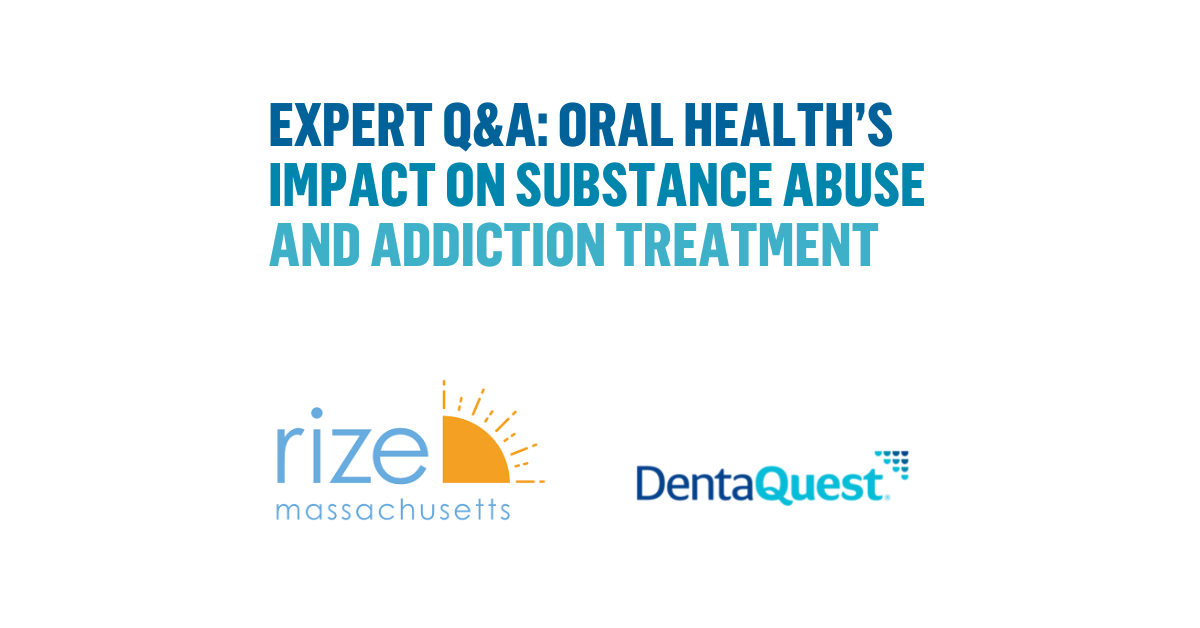When addiction and substance abuse come to mind, most people imagine damage to the lungs, stomach, heart or brain — not injury to teeth or gums. Unfortunately, drug use damages a user’s teeth and gums, creates ulcers in the mouth, and can result in a loss of teeth or costly treatments. And while there is a heavy focus on providing health care during recovery, oral health is often overlooked.
DentaQuest recently had the chance to talk to Julie Burns, the president and CEO at the RIZE Massachusetts Foundation, an independent nonprofit foundation working to end the opioid epidemic in Massachusetts, about how addiction can impact oral health and the importance of accessible whole-person care.
We know that many people who struggle with addiction also have co-occurring health issues that impact their overall health. How does oral health in particular fit into this?
Julie: Oral health problems are unfortunately very common among people who have substance use disorder. Some drugs are known to cause serious problems to teeth and gums. In addition, those working through substance use issues often tend to neglect self-care, specifically oral health care. Alongside hampering their interpersonal skills, improper oral health care can cause multiple problems such as inadequate nutrition, increased susceptibility to general and oral infections, and heightened oral sensitivity and pain.
How are you addressing access and equity in your work, and how can we build a more accessible and equitable health care system for all?
Julie: While the opioid epidemic has received increasing attention in the health care community and among the public, its unequal impact on minority populations has not. In Massachusetts from 2018-2019, the fatal opioid overdose rate increased among Black men and women and Hispanic/Latino men, while decreasing among whites and Hispanic/Latina women. Black, Indigenous, and People of Color (BIPOC) who use opioids have been punished, criminalized and had limited access to effective treatment for opioid use disorder(OUD) throughout the overdose crisis. Structural racism has driven these punitive approaches and resulted in societal responses to drug use in BIPOC communities that rely heavily on the criminal legal system. Inequitable access to health care also extends to lifesaving treatment for OUD, such as medications like methadone, buprenorphine and naltrexone.
As a nation, we have a chance to build an anti-racist public health response to the overdose crisis. RIZE Massachusetts Foundation (RIZE) has already started by creating a program called Innovations in Anti-Racism in Addiction Treatment. Our vision is that this program will have meaningful and positive results in reducing racism and improving access to evidence-based addiction treatment by reducing the stigma and structural barriers faced by Black, Latino and Indigenous people.
What are some examples of programs or policies you’ve seen work well to better provide whole-person care that makes a sustainable impact?
Julie: At RIZE, we believe that addiction treatment should focus on the whole person. Person-centered care is treatment, recovery planning and decision making that is respectful of and responsive to a person’s unique circumstances, wishes, values and needs. It centers on the goals of the person, not those of the service provider, program or system. Person-centered care is rooted in compassion, empowerment, shared decision making and the core belief that people can and do recover. Last spring, we held a discussion and released a white paper about the barriers to recovery. By sharing the experiences of people with substance use disorder, this event illustrated obstacles that can prevent individuals from accessing addiction treatment and recovery services in Massachusetts.
Much of RIZE’s programmatic work focuses on Harm Reduction. What is that and how can oral health providers practice it?
Julie: Harm reduction is an approach that emphasizes engaging directly with people who use drugs to prevent overdose and infectious disease transmission, improve the physical, mental and social wellbeing of those served, and offer low-threshold options for accessing substance use disorder treatment and other health care services. The National Harm Reduction Coalition has resources and trainings on many issues, which can be useful for all health care providers, including dentists.
How have you seen access to oral health improve outcomes and success for people in recovery for substance use?
Julie: Patients recovering from substance use disorder have a better chance at recovery and improved quality of life, including professional and personal life, if they take care of their oral health. Recent studies point to a link between proper oral care and emotional and physical recovery of a patient receiving treatment for substance use disorder.
To hear more about RIZE’s work, visit rizema.org and follow RIZE on Twitter and LinkedIn. For another perspective on oral health in substance use recovery, read our profile of Health Equity Hero: Lori LaPorte.
');
ppLoadLater.placeholderFBSDK = ppLoadLater.placeholderFBSDK.join("n");
Source link

